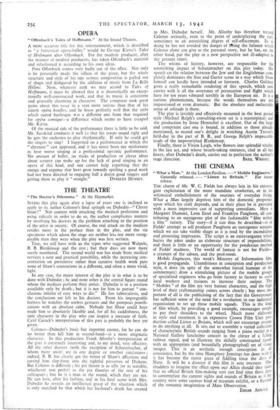THE THEATRE
"The Doctor's Dilemma." At the Haymarket.
SEEING this play again after a lapse of years one is inclined to apply to its author Colenso's final epitaph on Dubedat—" Clever brute!" Not content with attacking the medical profession and using ridicule in order to do so, the author complicates matters by involving his doctors in the problem attaching to the position of the artist in society. Of course, the real attack on the medicos resides more in the preface than in the play, and the six specimens which adorn the stage are neither less nor more recog- nisable than they were when the play was first written.
True, we still have with us the types who suggested Walpole, B. B. Blenkinsop and the rest ; but their days are now more surely numbered. The second world war has made State medical services a near and practical possibility, while the increasing con- centration on preventive rather than curative health work puts some of Shaw's contentions in a different, and often a more vivid, light.
In any case, the major interest of the play is in what is to be done with Dubedat ; he and none other is the central figure round whom the medicos perform their antics. Dubedat is in a position assailable only by death ; but it is not for him to pursue " con- clusions infinite of easy ways to die." He has tuberculosis, and the conclusions are left to his doctors. From his impregnable fortress he watches the useless gestures and the pompous pontifi- cations with an absolute calm. Nobody but Shaw could haye made him so absolutely likeable and, for all his caddishness, the only character in the play who can inspire a measure of faith. Cyril Cusack's interpretation of this part is probably the best yet given.
Colenso—Dubedat's basic but impotent enemy, for he can do no better than kill him at second-hand—is a more enigmatic character. In this production Frank Allenby's interpretation of the part is extremely interesting and, to my mind, very effective. All the other doctors (with the exception of Schutzmacher, of whom more anon) are in one degree or another carciatures ; indeed, B. B. has clearly got the better of Shaw's affections and carried him slap-bang into the rightful preserves of Dickens. But Colenso is different ; his pet theory is as silly (or as sensible, whichever you perfer) as the pet theories of the rest of his colleagues ; but he is a man in the round, which they are not. He can love, after his fashion, and in his final scene with Mrs. Dubedat he reveals an-intellectual grasp of the situation which is only matched by that which her husband's death has created
in Mrs. Dubedat herself. Mr. Allenby has therefore treated Colenso seriously, even to the point of underplaying the part. sometimes to an astonishing degree of self-effacement. In so doing he has not avoided the danger of Ming the. balance which Colenso alone can give to the personal story, but he has, on the other hand, put the play in a new perspective not ill-adapted to the present times.
The whims of history, however, are responsible for the astonishing impact of Schutzmacher on this play today. His speech on the relation between the Jew and the Englishman com- pletely dominates the Star and Garter scene in a way which Shaw himself can hardly have intended or foreseen. Charles Goldner gives a really remarkable rendering of this speech, which now carries with it all the overtones of persecution and flight which have for ten years vibrated terribly in the European air. It is a curious phenomenon, because the words themselves are not impassioned or even dramatic. But the absolute and ineluctable sense of solitude is there.
The play is lavishly and effectively mounted in the best period style (Michael Relph's consulting-room set is a masterpiece) and the production by Irene Hentschel is excellent. Out of the large and competent cast one is bound, in addition to those already mentioned, to record one's delight in watching Austin Trevor's field-day in the part of B. B., and George Relph's impeccable study of the impoverished Blenkinsop.
Finally, there is Vivien Leigh, who flowers into splendid vitality in the last act, and whose breath-taking entrance, clad in all her finery, after Dubedat's death, carries out to perfection the author's


























 Previous page
Previous page